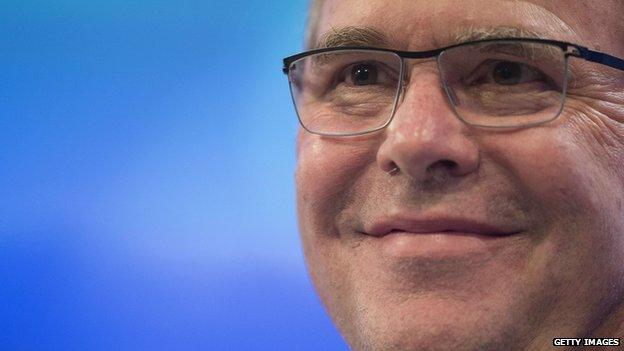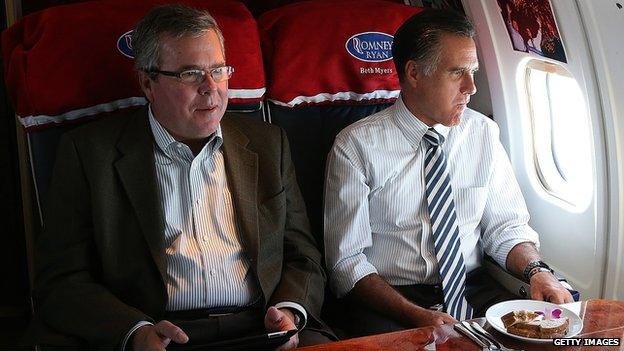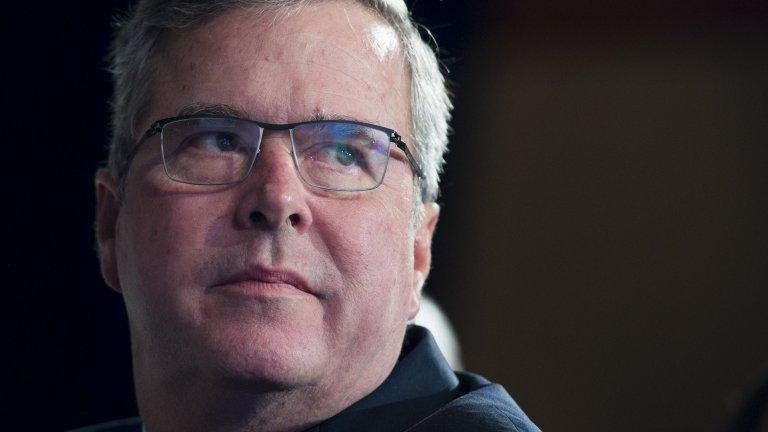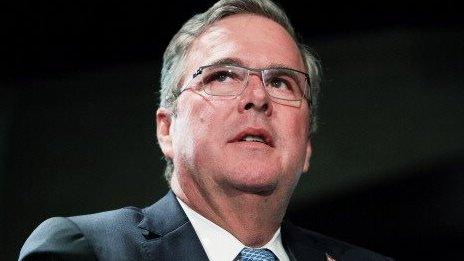Can Jeb Bush avoid Mitt Romney's fate?
- Published
- comments

On Tuesday morning, former Florida Governor Jeb Bush announced via Facebook that he is forming an exploratory committee to lay the groundwork for a possible presidential bid.
In case there was any doubt, the 2016 presidential season has officially begun.
With his credentials, deep pockets and familiar name, Mr Bush is well positioned to become the establishment candidate for a party that traditionally embraces the establishment pick.
As the old saying about the US presidential nomination process goes: "Democrats fall in love; Republicans fall in line."
Recent opinion surveys appear to bear this out, as Mr Bush ranks at the head of the Republican pack. A Real Clear Politics poll average, external puts him at 14.5%, with a four-point lead over his nearest possible opponent, New Jersey Governor Chris Christie.
"If Bush decides to advance from actively exploring a run to actively campaigning, he could have a real shot at the nomination," says, external the National Journal's Rebecca Nelson.
The National Review's Rich Lowry writes, external that Mr Bush's move immediately hurts other possible establishment candidates, like Mr Christie, Florida Senator Marco Rubio and Wisconsin Governor Scott Walker.
It could also, he says, prove a boost for a hard-core conservative candidate like Texas Senator Ted Cruz.

Like Mitt Romney in 2011, Jeb Bush faces a conservative base that has its doubts
"The Texas senator wants a pure establishment-Tea Party fight, and a Jeb candidacy does the most to tee that up by potentially squeezing out the candidates who have some appeal to both wings," he says.
This Cruz scenario, and the Tea Party doubts they represent, raises the spectre of the single biggest obstacle Mr Bush faces - similar to the one establishment-backed Mitt Romney grappled with four years before him.
For Mr Romney the challenge was explaining why he supported state-level healthcare reform that, after being implemented nationally by Democrats, had became anathema to the conservative base. For Mr Bush, his views on immigration reform that provides a pathway to citizenship for undocumented workers and his support for the federal Common Core education programme put him at odds with many grass-roots conservatives.
Mr Romney's strategy was to make a sharp turn to the right, abandoning some previously held positions. That worked in a drawn-out primary battle, but was widely viewed as burdening him with unpopular stances when he faced off against Barack Obama in the presidential campaign.
Early indications are that Mr Bush will chart a different course, attempting to defend his positions - to "lose the primary to win the general (election)", as he has described it.
"In essence, he may run the risk of doing things that are usually considered destructive in the GOP primary, but that he envisions will be so effective that he not only wins the primary but also emerges stronger for the general election," Noah Dickerson writes, external in Slate.
The reality, says, external the Washington Post's Paul Waldman, is that Mr Bush doesn't have much choice. He's considered the "single most prominent advocate" for Common Core. And on immigration, his feelings are even more deeply held.
"He wrote a book on immigration reform (which his opponents' aides are no doubt scouring for quotes that can be used against him)," Waldman writes. "His wife is an immigrant from Mexico. He speaks Spanish. His kids look Hispanic. He's not going to suddenly change his position on immigration."
And immigration is going to be a key issue during the Republican primaries. As the New Republics Brian Beutler explains, external, Mr Obama's unilateral executive order deferring deportation for millions of undocumented immigrants has all but assured that.
Unlike many political issues, which can be discussed in the abstract, presidential aspirants will be faced with a clear question. Will they rescind Mr Obama's order or not?
"Absent Obama's actions," writes Beutler, "Bush could dance around the issue of immigration without betraying his pro-reform leanings - play up the need for border security, play down the urgency of the issue more generally."
Now, however, he can't do that. Mr Bush has said the order was "extraconstitutional" - but he hasn't yet spelled out what he would replace it with. And if he makes any move toward creating a legal status for the affected immigrants, Beutler says, "the right will abandon him".
"Faced with such a threat, Bush could just as easily retreat from his compassionate position on the issue," Beutler continues. "Other Republicans have executed a similar volte-face. But then he'll just become another Romney-like figure who by his own lights can't win the presidency."
Ben Shapiro of the conservative Breitbart.com, summed up exactly how difficult Mr Bush's challenge will be.
"GOP geniuses," he tweeted, external. "In 2012, top issue was Obamacare, so we ran the Republican who invented it. In 2016, top issue is immigration, so we run Jeb?"
Of course there's still the chance that Mr Bush decides not to run. But as columnist Mark Shields regularly points out, external, exploratory committees "are invariably stocked with incurable optimists who, wherever they explore, come back with the same sunny conclusion: voters overwhelmingly want The Unannounced Candidate to run!"
Are Americans - and, of more immediate concern, Republicans - ready to consider another President Bush? Mr Bush's strategy to risk losing the primary to win the presidency sounds good - unless, of course, he actually loses in the primaries.
- Published16 December 2014

- Published16 December 2014
- Published3 March 2014
